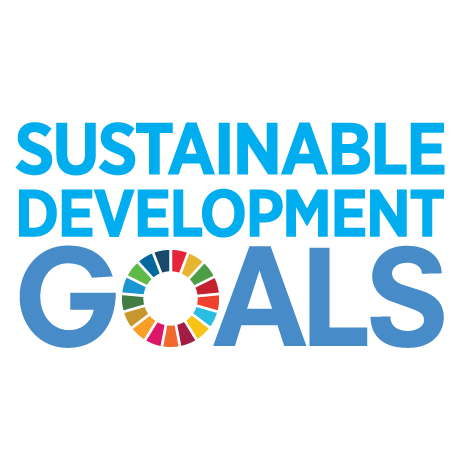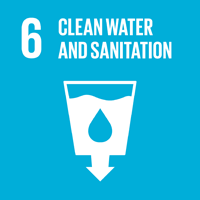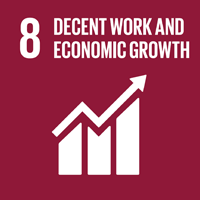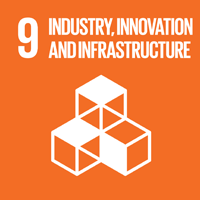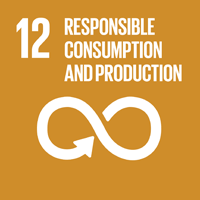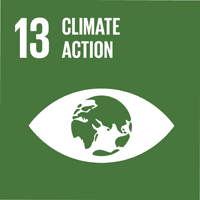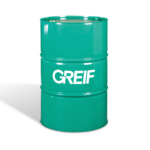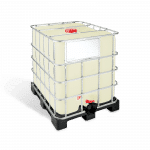- Sustainability at Greif
- Nachhaltigkeitsstrategien
- Ziele und Leistung
- ESG-Reporting-Indizes
- Bericht-Downloads
Highlights
- At Greif, we have been incorporating recycled materials into our products for decades. Our Build to Last strategy demonstrates our commitment to being industry leaders in circularity.
- Advancing our product sustainability initiatives was a leading focus in 2024, particularly by creating opportunities to use post-consumer resin (PCR) and improving the recyclability of our plastic containers. Our innovative barrier coating technologies for plastic containers prevent the loss of our customers’ products while protecting the container from contamination.
- We create value for our customers by offering a broad suite of solutions that help them meet their sustainability goals.
- We continue to monitor the evolving regulatory landscape and are preparing to align our sustainability targets with new regulations as they emerge, including the EU’s Packaging and Packaging Waste Regulation (PPWR and Waste Framework Directive).
- In 2025, we expect to refine our sustainability targets based on an updated baseline, where circular manufacturing will play a key role in achieving our goals.
Warum zirkuläre Fertigung wichtig ist
Our Build to Last strategy and business model are rooted in circular economy principles. With our extensive expertise, legendary customer service, global reach, and diverse portfolio of solutions, we are uniquely positioned to deliver innovative, sustainable, and circular products and services. Circular manufacturing is central to our efforts to meet our customers’ needs today while preparing for the future as they navigate regulatory changes, shifting consumer trends, and ambitious sustainability goals. Advancing the circular economy is essential for our business growth, colleague engagement, talent attraction, and environmental impact.
Collaboration across value chains is critical to driving a circular economy. We strive to maximize waste diversion, material recovery, and value creation for our suppliers and customers. By promoting recycled content, collecting end-of-life containers, and forming strategic partnerships, we deliver sustainable solutions that drive mutual success. Reconditioning, recycling, and increasing recycled content throughout the product life cycle reduce resource consumption, minimize waste, and lower carbon emissions.
Our Approach
Our circular economy strategy emphasizes a cradle-to-cradle approach, advancing five key circular economy principles:
- Reduzierung des Einsatzes neuer Rohstoffe.
- Abfallreduzierung und Minimierung der Nutzung natürlicher Ressourcen.
- Innovation und Verbesserung der Recyclingfähigkeit sowie Verwendung recycelter Materialien.
- Faserbasierte Alternativen zu Einwegkunststoffen.
- Life cycle services including the collection, reconditioning, and recycling of used products.
Advancing circularity is a shared responsibility across our business and enabling functions. For example, our supply chain team integrates circularity objectives into key procurement categories like resin and steel, while sourcing managers explore innovative projects and new supply sources. These efforts embed circular principles into daily operations and help us achieve our 2030 circularity goals.
Reducing reliance on virgin raw materials is a cornerstone of our strategy. Lightweighting, downgauging, and prioritizing recycled materials are integral to our product design process. For instance, our EcoBalance product line incorporates up to 100 percent recycled high-density polyethylene sourced from post-consumer containers. Collaboration with customers and suppliers promotes the adoption of recycled and recyclable products, thereby aligning sustainability and business success.
We detail our approach and progress towards becoming a zero waste-to-landfill organization in the Abfall dieses Berichts.
Product Portfolio
We offer packaging solutions for essential industries, including agriculture, agrochemicals, specialty chemicals, food and beverage, pharmaceuticals, and more. Our solutions embrace circular economy principles:
- Sustainable Fiber Solutions: Our vertically integrated solutions through the fiber packaging value chain demonstrate a circular economy. Our paper packaging solutions include fiber drums, tubes and cores, partitions, paperboard and containerboard, and corrugated products. We also develop products that replace single-use plastics with fiber-based alternatives. In 2024, 71 percent of all fiber products manufactured were sourced from recycled materials. Our Recycled Materials Group collected 3.4 million metric tons of fiber, of which 41 percent was then processed by Greif mills to produce paperboard for our paper packaging solutions.
Greif EnviroRAP
Greif EnviroRAP is 100 percent recycled paperboard with an innovative water-based, recyclable, and repulpable poly-alternative coating.
- Durable Metal Solutions: Steel drums are a sustainable packaging solution due to their infinite recyclability. They can even be reconditioned and reused multiple times before recycling. In 2024, our Life Cycle Services (LCS) network reconditioned and sold more than 1.2 million steel drums. We manufactured new steel products with approximately 5-30 percent recycled content, depending on the region.
- Customized Polymer Solutions: Our polymer solutions, including plastic drums, jerrycans, and intermediate bulk containers (IBCs) are lightweight, durable, and high performing. Our plastic packaging products are fully recyclable, supported by our comprehensive suite of barrier protection alternatives. Additionally, we reconditioned more than 1 million IBCs and 322,000 plastic drums.
Lebenszyklus-Services
- Steel and Plastic: Our LCS network provides access to used steel, plastic, and paper products that reduce demand for virgin raw materials. In North America and Europe, we collect and recondition used steel, plastic, and IBC packaging products, making them suitable for reuse and resale. In 2024, our LCS network collected 3.6 million containers, reconditioned or remanufactured more than 2.6 million of these containers and recycled the remaining containers.
- Fiber: Greif’s Recycled Materials Group (RMG) serves as a commercial and industrial recycling partner, recycling all forms of paper and select plastics in the U.S. In 2024, RMG collected 3.4 million metric tons of material, with 41 percent used in our paper products and 59 percent sold to external mills. 86 percent of the fiber used in our paper manufacturing at our mills is sourced from recycled materials. We are a net positive recycler and a key player in the paper recycling industry.
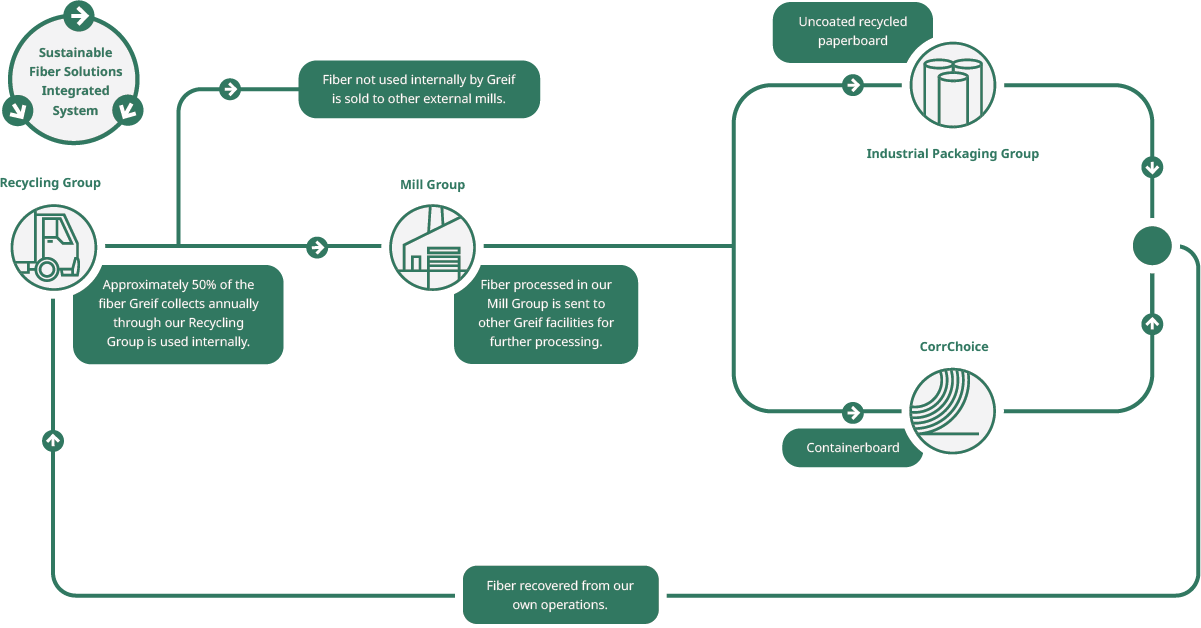
Navigating Regulatory Landscapes
We proactively monitor evolving regulations related to circularity and waste. In 2024, we collaborated with trade associations and industry groups to stay informed, advocate for practical sustainability measures, and share insights. As new regulatory requirements emerge, we plan to refine our sustainability targets to ensure alignment. Circular manufacturing will remain central to achieving these targets.
Goals, Progress, & Performance
Ziele für 2030:
- 100 Prozent der Greif-Produkte recycelbar machen1.
- Erreichen eines durchschnittlichen Anteils von 60 Prozent recycelten Rohstoffen in allen unseren Produkten2.
- Wir gewinnen durchschnittlich 80 Prozent der Materialmenge vom Markt zurück, die wir an den Markt liefern.3.
We have made significant strides towards achieving our 2030 goals, particularly within our Sustainable Fiber Solutions segment. Approximately 99 percent of our fiber solution products are recyclable and, on average, are made from 71 percent recycled content. Additionally, our RMG group collects 246% of the volume of fiber products that we sell.
We are tagging products appropriately across various systems to monitor recycled content and material recovery accurately as we progress toward our goals. In 2025, this process includes automating data collection and management activities to drive operational efficiencies and real-time data availability.
Across our Customized Polymer Solutions segment we are focused on a thorough review of sourcing, equipment, and technical capabilities to evaluate our capacity to increase PCR usage within our products.
We are working towards building a global network of material recovery solutions to reach our 2030 goals while growing our global reconditioning network. In November 2024, we acquired a majority stake in Delta Containers Manchester in the United Kingdom to expand and enhance our Intermediate Bulk Container (IBC) reconditioning and recycling services across the UK and Ireland. In December 2024, through our subsidiary Centurion Container LLC, we acquired the operations of Enterprize Container Corporation (“Enterprize”). Enterprize is an industrial reconditioner in Tennessee, U.S. that provides reconditioned and rebottled IBCs as well as reconditioned plastic drums.
Durch die Arbeit mit einem umfangreichen Portfolio an Rohstoffen und Produkten werden die Recyclingziele von Greif nach Gewicht verglichen und auf Unternehmensebene konsolidiert.
Die Ziele für den Recyclinganteil von Greif-Produkten sind Mindestdurchschnittswerte, die für ein Portfolio von Materialien und Produkten nach Gewicht ermittelt und auf Unternehmensebene konsolidiert werden.
[3] Bei den Rückgewinnungszielen für Greif-Produkte handelt es sich um durchschnittliche Mindestwerte, die für ein Portfolio von Materialien und Produkten nach Gewicht ermittelt und auf Unternehmensebene konsolidiert werden.
Verwendung von recyceltem Kunststoff beim IBC-Formenbau
Greifs Tri-Sure-Anlage in Carol Stream arbeitete mit dem Einkauf von GIP Nordamerika, GIP Italien und vier GIP NA-Anlagen zusammen, um 800.000 Pfund recycelte Kunststoffharze für die Herstellung von IBC-Rück-/Eckfüßen und Eckschützern zu beschaffen. Diese interne Beschaffungsstrategie reduzierte die Kosten um $100.000. Das Team verwendete auch leere Wellpapp-Großkartons wieder, um die von ihnen hergestellten Recyclingprodukte zu versenden, und reduzierte so den Kauf von Wellpapp-Großkartons um 84 Prozent. Das Projekt schuf Unternehmenswert und brachte ökologische und finanzielle Vorteile, während es gleichzeitig zwei interne Kreisläufe schloss und zu den Prinzipien der Kreislaufwirtschaft beitrug, indem es Abfälle von Mülldeponien umleitete und für sie einen neuen Zweck fand. Aufgrund der herausragenden Nachhaltigkeitsauswirkungen des Projekts und seiner Skalierbarkeit auf andere Form- und Spritzgussanlagen wurden das Projekt und das Tri-Sure Carol Stream-Team mit dem Michael J. Gasser Sustainability Award ausgezeichnet.
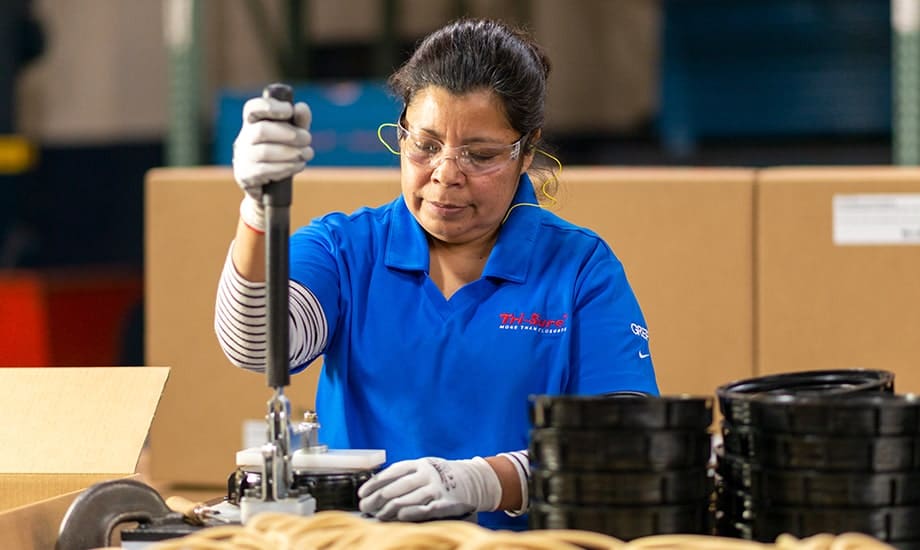
Überholung konischer Fässer in Portugal
For the past 20 years Greif’s RIPS facility in Iberia, Portugal has been supplying customers with reconditioned conical drums, having reconditioned over 10 million drums and saving 50,000 tons of steel, 197,600 tonnes of CO2 emissions, 2,600,000 gigajoules of energy and 343,200 cubic meters of water in the process. The project was initially started as a way to help address our customers’ wish to reduce waste and lower their carbon footprint and overall improve customer satisfaction. The team collaborated with customers to understand their needs, including volume, specification requirements and safety, developed a reconditioning process and ultimately installed a reconditioning line to begin serving customers. Today, the facility serves a multitude of customers, reconditioning 500,000 conical drums and saving 5,200 tons of steel each year.
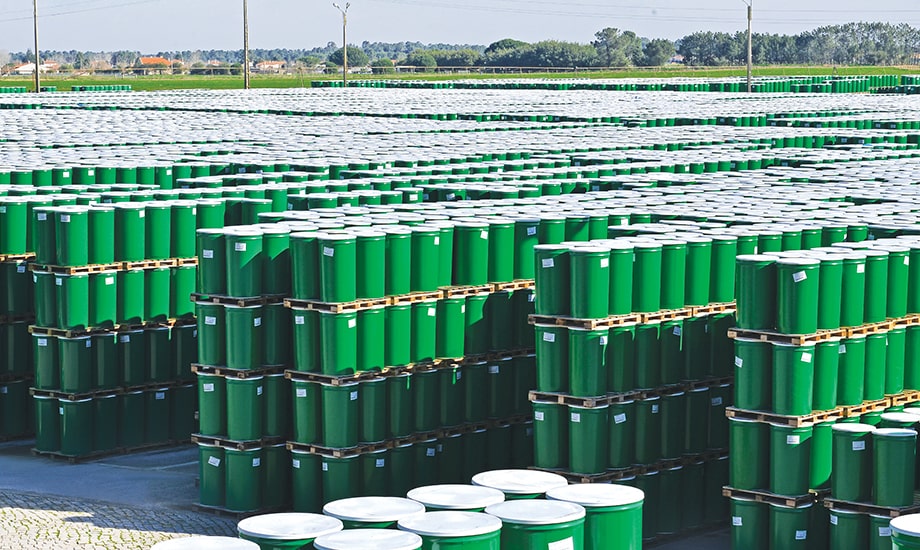
Ausbau der Cradle to Cradle-Dienstleistungen durch Investitionen und Joint Ventures
In recent years, Greif has made investments and established multiple joint ventures in order to expand the scale and capabilities of the reuse, recycling, and reconditioning services we provide. After acquiring a minority stake in 2020, Greif has continued its investment in Centurion Container LLC, owning 80% of the company as of April 2023, to expand our intermediate bulk container (IBC) reconditioning network in North America. After beginning a joint venture with Delta Plastics, the leading independent supplier of reconditioned IBCs in the United Kingdom, in 2020, Greif completed full-acquisition in November of 2024. Additionally, in December of 2020, Greif acquired a minority stake in LAF s.r.l., expanding IBC reconditioning services for our Italy-based customers. We look forward to working with our partners to continue to reduce our environmental impact through cradle-to-cradle solutions.
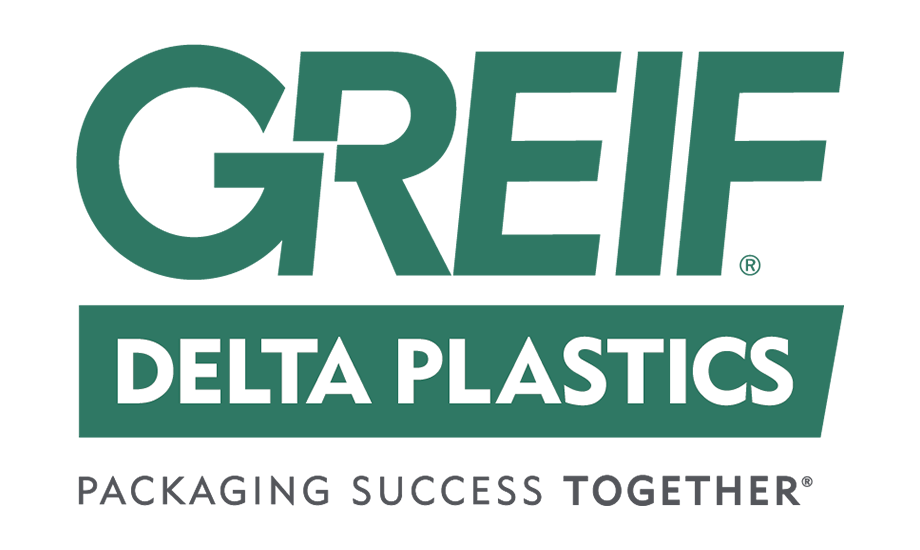
Moderne Überholungsdienste in Lille
Die LCS-Einrichtung von Greif in Lille, Frankreich, hat bedeutende Schritte unternommen, um die Logistik im Zusammenhang mit der Bereitstellung von Aufbereitungsdienstleistungen für unsere Kunden zu erneuern. Traditionell wurden leere IBCs von einem einzigen Standort für einen einzigen Kunden abgeholt und dorthin geliefert. LCS Lille hat damit begonnen, die Behälter von Standorten entlang der Lieferkette unserer Kunden abzuholen und dann aufbereitete IBCs an unsere Kunden zurückzuliefern, was die Logistik für unsere Kunden vereinfacht. Lille hat außerdem Datamatrix implementiert, ein Rückverfolgbarkeitssystem, das es uns ermöglicht, alle Produktionsschritte vom Empfang bis zur Lieferung aufzuzeichnen, Einblick in die Herkunft eines IBCs zu haben und eine Echtzeitansicht unseres Inventars bereitzustellen, um einen insgesamt verbesserten Kundenservice zu unterstützen. Datamatrix unterstützt auch eine bessere Verwaltung von Rückständen in den von ihnen abgeholten IBCs. Jeder IBC, der die Einrichtung erreicht, wird automatisch gewogen, um zu bestimmen, wie viele Rückstände sich im Behälter befinden und wie dieser behandelt wird. Mit Datamatrix können diese Informationen direkt an die Kunden zurückgesendet werden, um die Verwaltung der zur Abholung bereitstehenden IBCs zu verbessern. Lille verwendet ein geschlossenes Wasserkreislaufsystem für das Wasser, das zur Reinigung von IBCs verwendet wird, wobei 100 % des verwendeten Wassers recycelt wird, und sammelt, behandelt und zerkleinert Kunststoff, der zur Herstellung neuer IBCs und Kunststofffässer verwendet wird.
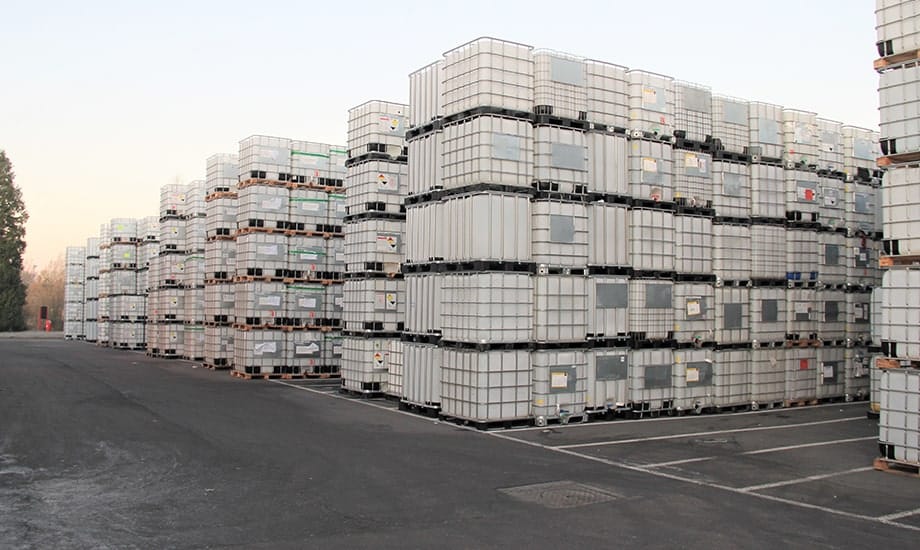
Wir bieten unseren Kunden eine zirkuläre Lösung
The CorrChoice GreenGuard® Die CorrChoice GreenGuard®-Produktlinie bietet unseren Kunden eine lebensmittelsichere, recycelbare und wiederaufbereitbare Alternative zu Zusatzmaterialien wie Kunststoffauskleidungen. Unsere GreenGuard®-Papierbeschichtungen sind für den direkten Kontakt mit den meisten Lebensmittelarten sicher und bieten Öl-, Fett-, Wasser-, Feuchtigkeits- und Abriebfestigkeit sowie eine innovative Wachsersatztechnologie. Indem wir die Beschichtung auf Wellpappbehälter auftragen, machen wir Zusatzmaterialien überflüssig, die in vielen Lebensmittelanwendungen verwendet werden. Wir arbeiten mit unseren Kunden zusammen, um sicherzustellen, dass unsere Produkte ihren Anforderungen an einen sicheren Umgang mit Lebensmitteln entsprechen und bieten gleichzeitig Verpackungsprodukte, die zu 100 % recycelbar und wiederaufbereitbar sind. So treiben wir unsere Kreislaufwirtschaftsstrategie voran und ermöglichen es unseren Kunden, ihre Nachhaltigkeitsziele zu erreichen.
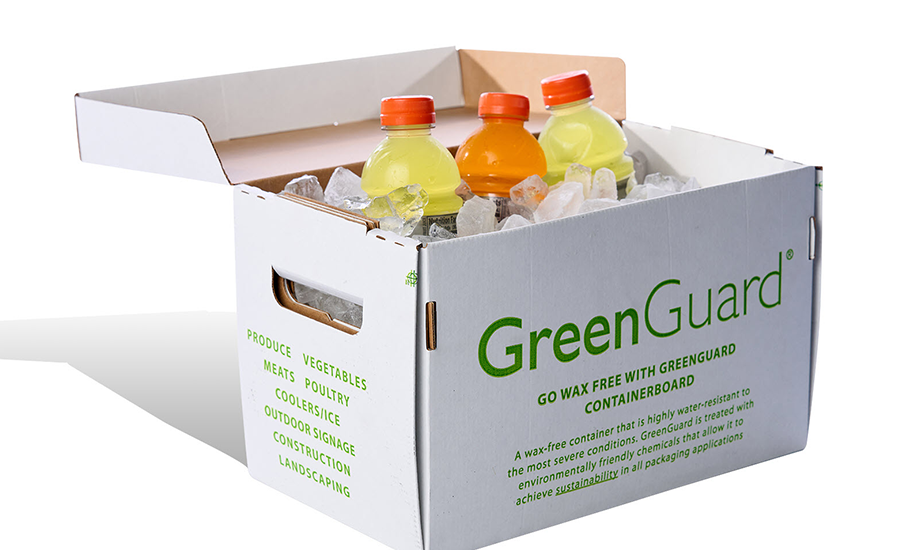
Folgen Sie uns
Abonnieren
© Copyright 2025 Greif. Alle Rechte vorbehalten.
Datenschutzübersicht
| Cookie | Dauer | Beschreibung |
|---|---|---|
| Cookielawinfo-Checkbox-Analyse | 11 Monate | Dieses Cookie wird vom GDPR Cookie Consent Plugin gesetzt. Das Cookie wird verwendet, um die Benutzereinwilligung für die Cookies in der Kategorie "Analytics" zu speichern. |
| Cookielawinfo-Checkbox-Analyse | 11 Monate | Dieses Cookie wird vom GDPR Cookie Consent Plugin gesetzt. Das Cookie wird verwendet, um die Benutzereinwilligung für die Cookies in der Kategorie "Analytics" zu speichern. |
| Cookielawinfo-Kontrollkästchen-funktional | 11 Monate | Das Cookie wird durch die GDPR-Cookie-Zustimmung gesetzt, um die Zustimmung des Benutzers für die Cookies der Kategorie "Funktional" zu erfassen. |
| Cookielawinfo-Kontrollkästchen-funktional | 11 Monate | Das Cookie wird durch die GDPR-Cookie-Zustimmung gesetzt, um die Zustimmung des Benutzers für die Cookies der Kategorie "Funktional" zu erfassen. |
| Cookielawinfo-Checkbox-Notwendig | 11 Monate | Dieses Cookie wird vom GDPR Cookie Consent Plugin gesetzt. Die Cookies werden verwendet, um die Einwilligung des Benutzers für die Cookies in der Kategorie "Notwendig" zu speichern. |
| Cookielawinfo-Checkbox-Notwendig | 11 Monate | Dieses Cookie wird vom GDPR Cookie Consent Plugin gesetzt. Die Cookies werden verwendet, um die Einwilligung des Benutzers für die Cookies in der Kategorie "Notwendig" zu speichern. |
| Cookielawinfo-Checkbox-Andere | 11 Monate | Dieses Cookie wird vom GDPR Cookie Consent Plugin gesetzt. Das Cookie wird verwendet, um die Benutzereinwilligung für die Cookies in der Kategorie "Sonstige" zu speichern. |
| Cookielawinfo-Checkbox-Andere | 11 Monate | Dieses Cookie wird vom GDPR Cookie Consent Plugin gesetzt. Das Cookie wird verwendet, um die Benutzereinwilligung für die Cookies in der Kategorie "Sonstige" zu speichern. |
| Cookielawinfo-Checkbox-Leistung | 11 Monate | Dieses Cookie wird vom GDPR Cookie Consent Plugin gesetzt. Das Cookie wird verwendet, um die Benutzereinwilligung für die Cookies in der Kategorie "Leistung" zu speichern. |
| Cookielawinfo-Checkbox-Leistung | 11 Monate | Dieses Cookie wird vom GDPR Cookie Consent Plugin gesetzt. Das Cookie wird verwendet, um die Benutzereinwilligung für die Cookies in der Kategorie "Leistung" zu speichern. |
| Angesehene Cookie-Richtlinie | 11 Monate | Das Cookie wird vom GDPR Cookie Consent Plugin gesetzt und wird verwendet, um zu speichern, ob der Benutzer der Verwendung von Cookies zugestimmt hat oder nicht. Es werden keine personenbezogenen Daten gespeichert. |
| Angesehene Cookie-Richtlinie | 11 Monate | Das Cookie wird vom GDPR Cookie Consent Plugin gesetzt und wird verwendet, um zu speichern, ob der Benutzer der Verwendung von Cookies zugestimmt hat oder nicht. Es werden keine personenbezogenen Daten gespeichert. |
Wählen Sie unten Ihre Sprache aus:
Verwenden Sie Google Übersetzer, um Ihre Sprache aus der Liste über die Symbolleiste oben auf der Seite auszuwählen.

